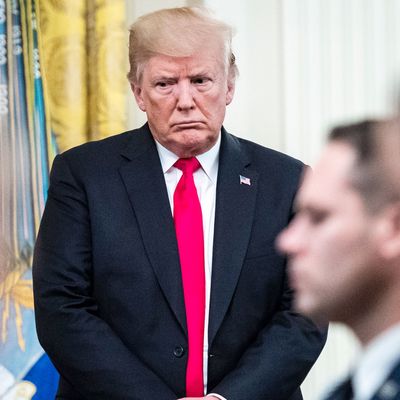
Last November, a person close to the Trump administration speaking to the Washington Post invoked a chilling metaphor. “This investigation is a classic Gambino-style roll-up,” the source said. “You have to anticipate this roll-up will reach everyone in this administration.” This turns out to be a perfectly apt and quite literal description not only of the investigation, but of Trump’s own ethos and organizing principles.
The way a roll-up of the Gambino family, or any other crime organization, would work is that the FBI would first find evidence of crimes against lower-level figures, and then threaten them with lengthy prison sentences unless they provide evidence against higher-ranking figures in the organization. The roll-up moves from bottom to top. It would be extremely difficult to prosecute any organized crime if it were not possible to trade lenient sentences in return for cooperation.
In an interview with Fox News, President Trump offers his view that flipping is dishonorable, and is so unfair it “almost ought to be outlawed.”
Trump does add that a scenario in which Manafort cooperates with federal investigators would involve him “making things up.” And it is certainly true that rewarding cooperation can give witnesses an incentive to fabricate testimony. However, Trump has also made clear, in tweets over the weekend, that he is not only opposed to false testimony. He opposes flipping on the boss as a matter of principle. Here he is over the weekend denouncing President Nixon’s lawyer John Dean as a “rat.”
Dean famously testified about Nixon’s obstruction of justice. Nobody claims Dean lied about Nixon. The sin in Trump’s eyes is that he flipped, violating the omerta. Trump even uses Mafia lingo, “rat,” to describe Dean’s cooperation with law enforcement. To gangsters, a rat is considered the worst kind of person because they pose the greatest danger to their ability to escape prosecution.
It is obviously quite rare to hear a high-ranking elected official openly embrace the terminology and moral logic of La Cosa Nostra. But Trump is not just a guy who has seen a lot of mob movies. He has worked closely with Mafia figures throughout his business career. “I know all about flipping, for 30, 40 years I’ve been watching flippers,” he tells Fox News. “Everything’s wonderful, and then they get ten years in jail and they flip on whoever the next-highest one is, or as high as you can go.”
Trump’s claim of expertise in his area is not some idle boast. He hired Roy Cohn, by that point a mob lawyer, worked closely with figures linked to the Russian-American mafia, Felix Sater and Michael Cohen, and made money in his properties attracting money launderers.
Like a mobster, Trump takes an extremely cynical view of almost every moral principle in public life, assuming that everybody in politics is corrupt and hypocritical. (Hence his defense of Vladimir Putin’s murdering journalists: “There are a lot of killers. You think our country’s so innocent?”) He also follows mafia practice of surrounding himself with associates chosen on the basis of loyalty rather than traditional qualifications. Since the greatest threat to a mafia don’s business is that subordinates will betray him, he typically surrounds himself with family members, even if they are not the smartest or best criminals. Trump has accordingly surrounded himself with his children, or demonstrated loyalists who would have trouble finding remotely comparable jobs at another business.
In the same interview, Trump casually admits that he selected Jeff Sessions as attorney general for precisely this reason — he assumed that, as one of the first members of Congress to endorse him, Sessions would show true loyalty. The only reason I gave him the job [is] I felt loyalty.”
Trump has internalized the mob ethos so deeply that he sees this as an indictment of Sessions. He gave the guy a job only because he assumed he was loyal, and here Sessions betrays the loyalty by recusing himself from the Russia investigation (because of a blatant conflict of interest). Trump cannot imagine that admitting he picked an attorney general solely out of the expectation of personal loyalty is a confession of an intent to corrupt law enforcement.






























